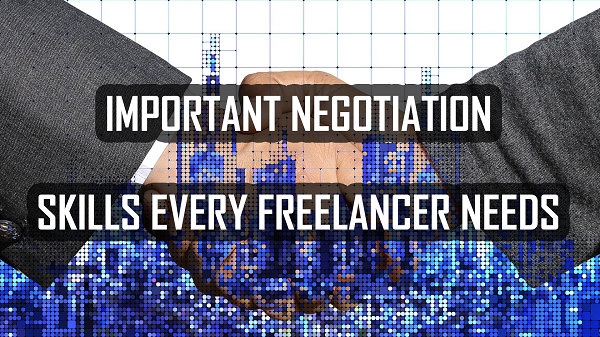As a freelancer, success can depend on having good negotiation skills, but many people find this part of the job to be just a little bit intimidating. If talking about money makes you nervous, you are not alone.
When you are hired at a job in the workforce you are told what hourly rate or salary you will be earning. That decision is predetermined. It’s made for you.
However, as a freelancer, you have the difficult – and often uncomfortable – job of putting a dollar value on yourself. And, as you probably already know, that is not easy. In fact, it can be really hard.

9 Negotiation Skills Every Freelancer Needs
Freelance work is appealing because it allows you to be flexible, and creative, and innovative. That’s where your strengths lie, right? The business side?
Well…that’s not quite as much fun. Unfortunately, negotiation comes with the territory. Your goal may be to bring imagination to life, but if you want to make a living doing it, you must attain valued skills that will help you succeed.
9 Must-Have Negotiation Skills For Every Freelancer
Here are some tips to help you get the most out of your negotiation experiences:
1. Understand the Game

Before you begin, do your homework. Familiarize yourself with the
market so you know the average rate that others are asking for similar services.
Who else is available to do the job, and how much will they charge?
You can guarantee that most clients will know the answers to these questions and will have some level of expectation before they even contact you.
You don’t want to undervalue yourself, but you also don’t want to quote outrageous prices. If you understand the game before you try to play, you will have a better chance of success.
2. Know Your Client
Again, do your homework! Find out a little bit about your client and their
work. Look at their website or other projects they have done.
Try to understand their style, personality, and expectations.
You don’t have to hire a private investigator to find out their favorite color or how they take their coffee, but showing that you took the time to become somewhat informed will make a positive impact and go a long way toward building a strong working relationship.
3. Downplay The Emotions

For acquiring effective negotiation skills try to downplay the emotions in the negotiation process but be professional
Using emotions as a way of getting the client to act in a certain way
can be risky. In fact, it can be seen as manipulative.
The negotiation process should be rational, practical, and professional. That doesn’t mean you should be a cold, emotionless robot.
After all, real people are involved and most clients want to be assured that you understand their needs and goals.
But, when it comes down to hashing out the terms of an agreement, you are more likely to maintain your credibility if you take a logical, level-headed approach.
4. Don’t Make Promises You Can’t Keep
Honesty and honor are critical. Tell the client what you can do and how long it will take you to do it.
A lot of people will promise the world and then fail to keep their word. It’s disappointing for everyone involved.
And, a disappointed client is not likely to be a repeat client. So, try not to commit to the impossible. Be honest and upfront.
5. Be Quiet

You don’t have to tell the client everything. Often, it’s better to keep some things to yourself.
Think twice before you offer information that isn’t asked for. And, even when questions are asked, a non-committal response may be best.
For example, if a client wants to know how busy you are or what you charged someone else for a similar project, you may prefer not to disclose this information. If it’s not going to benefit the negotiation process – or even hurt it – then just be quiet.
Also, since negotiations are often nerve-wracking, you may feel the need to fill the silence with words. But, once you give the client your quote or present your proposal, just be quiet and wait for a response. Resist the urge to defend or explain yourself. The ball is in their court, so let them play it.
6. And Value Yourself
Not everyone can do what you do. It’s a skill…a gift….an ability. It’s something that others are willing to pay for.
So, be careful that you don’t undervalue yourself. Explain what your quote includes (research, edits, fact checks, interviews, etc.) and show the client why you are worth it!
If you believe the package you are offering is attractive and your price is competitive, then don’t settle for less than you can afford. And, if you don’t feel good about it, be willing to walk away.
7. Call On Authority
If you have references from authoritative or reputable sources, don’t be
afraid to use them. Not only is it impressive, but it might be the very thing that tips the scales in your favour.
8. Be Willing To Compromise
Decide ahead of time what compensations you would consider,
what compromises you would be willing to make, and what points are absolutely nonnegotiable.
Know your bottom line and what you will accept or settle for; but, also be open to giving concessions and working out a deal that satisfies both you and the client. And, remember that flexibility isn’t always about money. You can ask for more time, offer a volume discount for large orders or repeat customers, or discuss the possibility of downsizing the project.
Whenever you set a price, always leave some wiggle room to allow for negotiations. When it’s all said and done, the ultimate goal is that everyone is happy with the agreed upon terms.

9. Have A Team Attitude
Listen to the client’s requests and requirements and approach
negotiations with everyone’s interests in mind.
If the client feels like they are part of a team – that you are all working together to make their vision a reality – they will be more likely to trust you and have confidence in your ability to get the job done.
Disclaimer
The advice provided on this website is general information only. It has been prepared without taking into account your objectives, financial situation or needs. It is general advice for freelancers about the questions they should ask a professional adviser. Before acting on this education material for freelancers you should consider the appropriateness of the material, having regard to your own objectives, and seek detailed personal advice from an appropriate professional.















